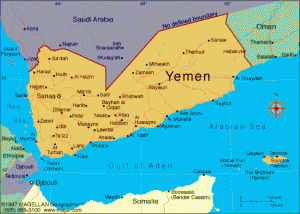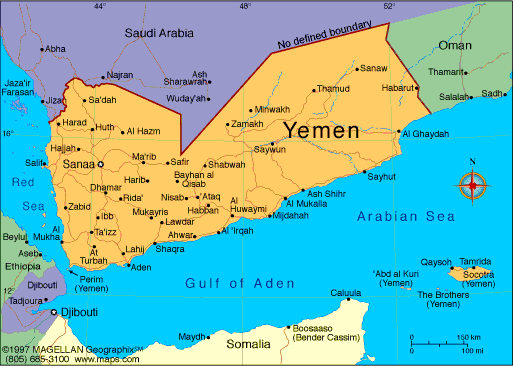 Yesterday, the United Nations Human Rights Council (HRC) adopted the report of the second Universal Periodic Review (UPR) of the human rights situation in the Republic of Yemen. The UPR of Yemen comes at a time when the human rights reform process in Yemen has stalled and requires renewed commitment by the government.
Yesterday, the United Nations Human Rights Council (HRC) adopted the report of the second Universal Periodic Review (UPR) of the human rights situation in the Republic of Yemen. The UPR of Yemen comes at a time when the human rights reform process in Yemen has stalled and requires renewed commitment by the government.
78 states made recommendations to Yemen during the session in addition to 15 who sent questions in advance. A total of 191 recommendations were made to Yemen on the state of human rights in the country.
The Cairo Institute for Human Rights Studies (CIHRS) and the Yemen Human Rights Network (YHRN)[1] commend the Yemeni government for its acceptance of 166 of these recommendations. Yemen referred the remaining recommendations for further examination. We call on the government of Yemen to set in place a national plan of implementation to ensure the realization of these human rights reforms.
During its first UPR cycle in September 2009, Yemen accepted 125 of the 142 recommendations made to it by states. Unfortunately, we note with great worry that most of these recommendations have yet to be implemented.
In its presentation, the high-level government delegation of Yemen, headed by the Minister of Human Rights, Ms. Hoora Mashhour Ahmed, admitted to the challenges that face the realization of respect for human rights in the country, including violations by non-state actors, the failure of the government to fulfill its responsibility to protect its citizens from abuse, and other political developments in the country.
The recommendations to the Yemeni government addressed the following areas: the urgent need for investigations of large-scale human rights violations committed in recent years, especially in the context of protests; the need for the establishment of an independent and impartial national human rights institute (NHRI); the halting of attacks against journalists and human rights defenders; and the need to include strong provisions on human rights and freedoms in the new constitution.
Additionally, the majority of states noted the deteriorating situation of women’s and children’s rights in the country, with a large number of recommendations calling on Yemen to make efforts to end gender-based discrimination in law and practice. In particular, states called on the Yemeni government to end the wide-spread practice of arranged marriages for young girls and to ensure the adoption of national legislation setting the minimum age for marriage at eighteen, in line with international standards. Further recommendations included putting an end to marital rape, child abuse, and the practice of female genital mutilation.
Dozens of states, including Denmark, Germany, Iraq, the UK and Tunisia, asked that Yemen speed up efforts to adopt a law on the creation of a National Human Rights Institute and ensuring its establishment in accordance with the Paris Principles.
We commend the government of Yemen for accepting these recommendations and urge that they been implemented immediately. In particular, we call for the NHRI to be created as an independent body with the mandate of monitoring and reporting on human rights abuses throughout the country and for the selection process of its members be based on merit rather than political affiliation and carried out in consultation with civil society.
The recurring issue of impunity for grave human rights violations committed in Yemen over the course of the past four years was brought up by a number of states. Poland and Australia expressed concern over cases of extrajudicial killings and mass violations in the context of protests, while the Czech Republic recommended that Yemen publish clear instructions on the use of force by law enforcement officials during protests in accordance with international standards.
Despite promises made by Minister Hoora Mashhour in this context to speed up the functioning of the National Commission of Inquiry which was established by a presidential decree, we believe that the process of accountability has stalled due to a lack of political will on the part of the government and its failure to allocate the necessary resources to achieve this objective.
Thus, CIHRS and YHRN call on the Yemeni government to announce a clear timeline for the National Commission of Inquiry to start its work and to immediately announce a specific date by which the commissioners of this body will be appointed. If the Yemeni government continues to demonstrate that it is unwilling or unable to provide national accountability for the thousands of peaceful protesters who have been killed, then the international community has a duty to ensure justice for these victims through international investigations, as originally recommended by the United Nations Fact Finding Mission to Yemen in 2011.
In this context, and while the efforts made by Yemen to sign the Rome Statute were welcomed, several states, including Latvia, Switzerland, Australia, and South Korea, called on Yemen to ratify the Statute and reflect its provisions in national legislation.
In recent years, civil society has documented mounting violations against journalists, rights defenders, and freedom of expression in general. In its most recent annual report, the Yemen Human Rights Network documented attacks on 577 journalists and media professionals, and bombings of satellite channels, confiscation of equipment, closure of independent newspapers, and other severe violations have also been documented. In this context, Canada, France and the US called upon the Yemeni government to put an end to threats against journalists and to take all necessary measures to protect them, while Columbia and Norway expressed concern about the status of human rights defenders in the country and asked for a clear legal framework to protect them.
We reiterate the call for the government of Yemen to halt all attacks on journalists and media outlets and ask that the government implement the recommendations made by Canada and Palestine to finally adopt the Press and Publications Act in a manner fully compliant with international human rights standards of freedom of opinion and expression.
Finally, CIHRS and YHRN believe that several states were able to make some concrete, strong recommendations to Yemen at this session of the UPR. While we note with appreciation the Yemeni government’s acceptance of the majority of these recommendations, we urge Yemen to immediately set out on their implementation. We, as members of civil society, will continue to closely monitor the commitments made by Yemen over the last several years and during this session of the UPR, making all efforts to push for genuine progress on accountability and respect for rights and freedoms in the country.
The YHRN consist of nine Yemeni organizations and the Danish Institute for Human Rights (DIHR). Among the nine organizations are Human Rights Information and Training Centre (HRITC), Women Journalists Without Chains, Democracy School, The Yemeni Observatory for Human Rights, Hood, The Yemeni Organization for Defense of Rights and Democratic Freedom.
Share this Post

